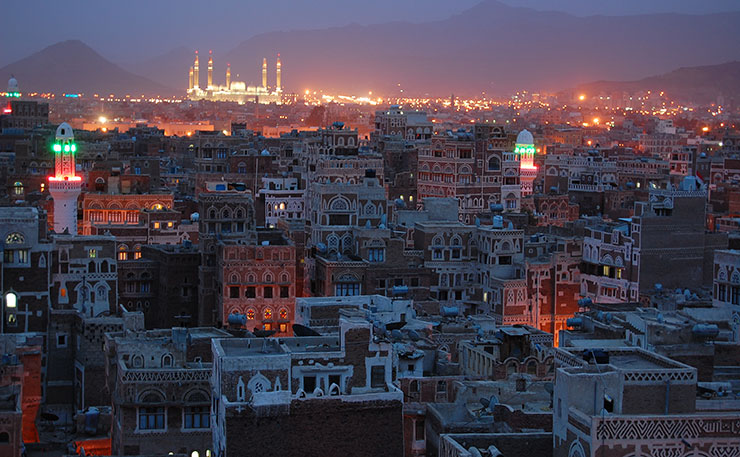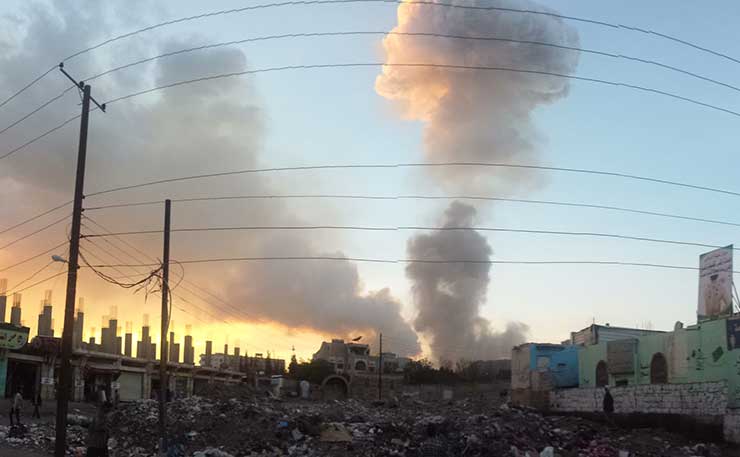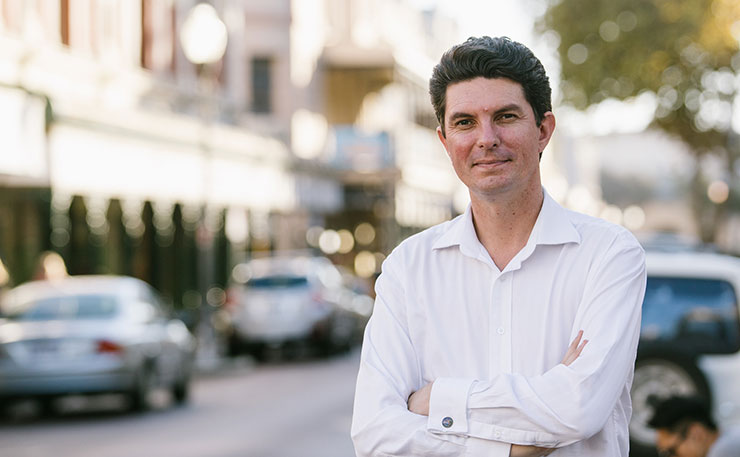A frank discussion with Michael Brull about an international conflict supported by our nation that has drawn precious little Australian interest.
Last week, I wrote about the increasingly dire warnings coming out of Yemen. The United Nations warned that almost seven million people were in a “state of emergency”, just one step from famine. Save the Children warned that “If things are not done now”, millions might die.
This is not because of an earthquake, or crop failures. It is because Yemen is a poor country, which before 2015 imported 90 per cent of its food. In March 2015, it was invaded by a coalition of countries, led by Saudi Arabia.
In August 2015, Saudi Arabia imposed a blockade, which has resulted in a rapidly worsening humanitarian catastrophe. Yet throughout the conflict, Australian politicians have not uttered a single word criticising the invasion, the war, or the blockade. It has been entirely missing from the political agenda.

I asked the Australian Labor Party and the Greens to respond to the criticisms I made of them for their silence on the war in Yemen. Senator Scott Ludlam, the Greens spokesperson on Foreign Affairs, agreed to a phone interview on the war in Yemen.
They’ve proceeded with effectively the destruction of an entire country’s basic infrastructure
I began by asking Senator Ludlam about his view on the Saudi led coalition’s invasion of Yemen:
“Oh god, where to even begin. I don’t think there’s any doubt at all that there are war crimes and crimes against humanity being perpetrated, there appears on a first reading, it looks as though there’s been indiscriminate bombing of civilian targets in Yemen. But on closer examination it’s actually extremely discriminating. They are targeting water extraction plants, ports, transport infrastructure, hospitals, schools. There’s systematic destruction as far as I can tell, of an entire country’s civilian infrastructure… that is well and truly illegal under international law.”
I was impressed by Senator Ludlam’s forthright condemnation of the war. However, I also wanted to know his position on the invasion itself. I asked him, “Do you think that aside from how they are conducting the war that they had the right to invade Yemen in the first place?”
Senator Ludlam replied:
“The origins of the conflict are somewhat murky and obviously accounts differ… The Saudi authorities say that they’re at the invitation of the legitimate government of Yemen. I think that statement is contestable in itself. But nonetheless, even if that were to be the case: they’ve since proceeded with effectively the destruction of an entire country’s basic infrastructure. So even if they were there on legitimate grounds that doesn’t then excuse the incredible catastrophe that’s been unleashed.”
I was disappointed Senator Ludlam wouldn’t come out and condemn the invasion. I replied: “Okay, so I just want to push back on this a bit. So, what they call the legitimate government was President Hadi, who was imposed by the Saudi backed plan for Yemen. And his legitimacy is based on an election, I think in 2012, where there was only one candidate, it was him, and he won 99 percent of the vote.” Senator Ludlam responded “I wonder what happened to the one percent?” In, fact, I was being unfair to President Abd Rabbu Mansour Hadi, who won an even more impressive 99.6 percent of the vote.
Senator Ludlam went on:
“I’m just saying, that’s the pretext, you know, that’s the legal authority that they claim. It’s an identical legal authority to the United States and Australia being invited back into Iraq by what was considered the government at the time. So I’m not excusing it. I’m just saying that that’s the pretext on which they’re there. Even if they were legitimate, which it clearly isn’t, it doesn’t excuse what has happened since then.”
I asked, “So you think it’s clearly not legitimate?” Senator Ludlam: “I think it would be very difficult to make the case that it was. Like I say, accounts differ, but I don’t contest the basic point that you’re making, no.”
The need for a broad based arms embargo
I put to Senator Ludlam the facts about the enormous support given to the Saudi military by Western states, such as the $115 billion in arms sold to them by the Obama administration.
This support is what makes the war on Yemen possible – it would end tomorrow if the West withdrew its support. I asked him if he had any comment on this.
“Sure, I guess there are two. The first is not to leave Australia out of the loop. We provide diplomatic cover to Saudi Arabia, they’re considered an ally. When the King died, from memory, we lowered the flag on Parliament House to half mast, which doesn’t happen every day. And it’s difficult to establish, although we’ve started the process of establishing whether Australia is engaged in arm sales or military equipment sales to Yemen, and if so to what degree. So that’s the economic side, and on the diplomatic side, these are two of our closest allies that are very deeply implicated in bombing a country back to the stone age.
So one of the things that we’re interested in establishing is, the Foreign Minister has made a couple of half-hearted statements about restraint. But [was]the subject of Yemen raised when she visited her counterparts in Washington a week or two ago? We don’t think [there is]any excuse or any kind of rational explanation that could account for the damage that’s being done there, and the fact that they appear to be trying to starve an entire country into submission.”
I asked “Do you think that countries like the US, UK and possibly Australia should suspend all military ties and weapons sales to Saudi Arabia?”
“I think it should go a little broader than that, I can’t think of a better example of the need for a broad based arms embargo, and yes, that would obviously start with our great and powerful allies. But the civilian population being pulverised and starved, and yes that conflict is being fuelled by weaponry and you know, other kinds of logistical intelligence support from outside the region.”
I asked if he had any comments about Saudi Arabia “generally and Western support for it, and Australian support for Saudi Arabia”.
“It appears to go along with the US alliance, seems to be a package deal, that you can see what’s happening at the moment with the Trump administration’s hysterical approach to the Islamic world, [it]has a very special carve out in place for the government of Saudi Arabia and the relationship between the two kingdoms, as it were, appears to be even stronger if anything than it was under the previous US administration.
So, Australia gets caught up in that set stream, Australian foreign policy obviously is set in Washington, and if Washington says we’re excluding Saudi Arabia from the otherwise radically Islamophobic mood sweeping the nation, then Australia does so as well. And so I feel like with our foreign priorities set in DC rather than here in Canberra, it’s sort of part of the deal. And that’s why, I suspect that’s one of the reasons why Australia has been so unwilling to make comment of any kind on the conflict in Yemen.”
There’s an extreme double standard operating around foreign fighters of Australian origin
I then asked Senator Ludlam for his thoughts on Australian mercenaries fighting for the Saudi led coalition in Yemen.
“To be perfectly frank with you, I didn’t realise that was the case until I saw your piece, the New Matilda piece I think. That’s remarkable, and looking at the double standard that appears to prevail, where people can be arrested and jailed for even contemplating travelling into the horror of the Syrian civil war, or Iraq, to fight for one side or the other, but Australian nationals are apparently deeply embedded in the war on Yemen. I guess fighting for the side that the Australian government’s providing diplomatic cover to. There’s an extreme double standard operating there around foreign fighters of Australian origin.”
I asked, “Do you think that some kind of measures should be made to stop Australian mercenaries fighting in the war in Yemen, and what would that look like?”
“The government, actually, they gave themselves the legal tools to be able to do that, when it was realised by the Australian intelligence community how many were already engaged in the Syrian civil war or in Iraq, or planning on travelling.
The Australian government gave themselves tools, legal tools, which we contested at the time, and I think, are kind of suspect in their legal underpinnings. But nonetheless, they do have the ability, if they chose to, to prescribe particular areas, conflict areas, to prescribe Australians from travelling into those regions.
So if the government wanted to, they actually have the ability now to criminalise Australians or other foreign nationals from fighting in that conflict.”
I replied that “I share your reservations about those laws so I just thought…” Senator Ludlam laughed. He said, “I know, I know, that’s partly you know why we’re not thumping the table demanding that they exercise those powers, but for me I guess that just underscores the double standard that prevails. That it was all hands on deck, this Parliament dropped everything so that that bill could be debated, because it was an emergency.”

I suggested an alternative approach. That “Australia could legislate that if Australians are accused of war crimes or crimes against humanity, that those could be investigated in Australia, or if we imposed something like universal jurisdiction for war crimes under international law, or something like that?” Senator Ludlam replied, “I think that it’s certainly something that they could do. I would obviously want to get prior legal advice before I came out strongly on it one way or the other, but I don’t think there’s any legal impediments to doing that.”
The Greens silence on Yemen
As someone who generally likes the Greens, I have been quite disappointed by their silence on the war in Yemen. I asked Senator Ludlam’s media team for comment several months ago, and didn’t receive a reply. After my article last week, I emailed them again seeking comment.
Media representative David Paris set up the interview. In an email exchange, he also defended Ludlam’s record: “Though Scott hasn’t publicly commented on Yemen since his return from illness (a speech is on the agenda for us this week, hopefully tomorrow night) it’s not accurate to say the Greens have been silent. Scott first spoke about it in 2014, Peter Whish-Wilson most recently asked questions about atrocities in Yemen in the last estimates session of 2016, while covering Defence for Scott. Could always do more though.”
In 2014, the war had not yet started, as the Saudi led invasion occurred in 2015. As for Senator Whish-Wilson, he made the following two references to Yemen in October last year:
“My question is on the terrible bombing of hospital facilities in Yemen, Syria and Afghanistan, which obviously is a matter of significant and immense public concern around the world. There have been at least 23 attacks on hospitals in East Aleppo in the last three months. Every functioning hospital in East Aleppo has been damaged. What is the department’s appraisal of the current tactics that are killing civilians in Syria and Yemen, particularly those receiving medical attention?”
Senator Ludlam made a similar reference to “Syria, Yemen and Afghanistan” in May 2016. I regarded this defence of the Green’s record as almost insultingly weak.
In the course of my interview with Senator Ludlam, I asked him about his silence on the war on Yemen. At one point he said “It’s not because we don’t care, and it’s certainly not because the situation isn’t serious. It’s that it got really, really horrific while I was on leave, I came back in the middle of the state election, and to be honest, I haven’t been giving any part of the foreign affairs portfolio the attention it deserves. But Yemen was obviously approaching the worst of the worst…”
I asked him if he regretted not speaking out about the war sooner.
“You know, if you like, you can give me a kicking for not having said much about the holocaust in the DRC, or what’s happening in South Sudan. Yes of course I regret it, there aren’t enough hours in the day, and this is a massive conflict. I mean, it may in the scale of things be the biggest conflict on earth at the moment in terms of the magnitude of the civilian toll, or potential toll. So, yes, of course.”
Julie Bishop cheerleading the Saudis
I asked Senator Ludlam if he had any comments on Foreign Minister Julie Bishop’s two early statements about the war, and her silence since. He replied, fairly, that “I can’t really be throwing rocks about how vocal people have been. The only stuff that… she appeared to have put on the record, was providing diplomatic cover, and cheerleading the Saudis. So I don’t know that that’s a particularly helpful contribution.”
I said that I’d be happy to hear some more criticisms, given that I am unaware of anyone other than me criticising her statements and silence on the war in Yemen. Senator Ludlam said, “She’s been incredibly low key, given the magnitude of the conflict, and the only statements that she’s made appear to be backing in Saudi military action, so that’s… problematic to say the least.”
The second part of this series, dealing with Labor’s response to Yemen, will be published later this week.
Donate To New Matilda
New Matilda is a small, independent media outlet. We survive through reader contributions, and never losing a lawsuit. If you got something from this article, giving something back helps us to continue speaking truth to power. Every little bit counts.





